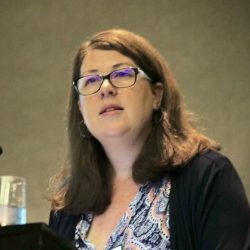Unravelling the Mysteries of Hypnotic Ability: A Componential Approach

Presented by
Professor Amanda Barnier
In hypnosis, mere words can have a remarkable effect on some people. Research suggests that, once developed in childhood or adolescence, hypnotisability is a lifelong ability that helps to predict therapeutic benefits for both hypnotic and nonhypnotic treatments. But despite over two centuries of scientific and clinical investigation and practice, we still do not fully understand the nature and source of hypnotic capacity. Why do some people experience the full effects of hypnosis whereas others do not? Drawing on over three decades of work in the field, I describe a “componential approach†that has helped researchers to better understand another important cognitive ability – the ability to read – as well as helped practitioners to successfully treat reading disorders. I discuss how and why this componential approach to reading might be usefully applied to hypnosis. And I finish with a call to action for a modern day, citizen science version of the 19th century pioneering work in our field. Together we might at last solve the mysteries of hypnotic ability.
Amanda is a cognitive psychologist and a Professor of Cognitive Science. She began her career at Macquarie University, graduating in 1991 with a Bachelor of Arts (Honours) majoring in Psychology. She then went on to complete a PhD in Psychology (1996) at the University of New South Wales (UNSW). Following postdoctoral work at the University of California, Berkeley, Amanda returned to UNSW as an Australian Research Council (ARC) Postdoctoral Fellow and later as an ARC Queen Elizabeth II Fellow. In 2007 she moved to the Macquarie Centre for Cognitive Science at Macquarie University as an ARC Australian Research Fellow. In 2013 she became an ARC Future Fellow in the Department of Cognitive Science at Macquarie and from 2011-2018 she was a Chief Investigator of Macquarie’s ARC Centre of Excellence in Cognition and its Disorders. In 2017, Amanda moved into a University-level research strategy role as Associate Dean Research for Macquarie’s Faculty of Human Sciences and in 2020 joined Macquarie’s leadership team as Pro Vice-Chancellor (Research Performance and Development). Amanda’s research focuses on memory, hypnosis, and memory and hypnosis. She has won over AUS$4 million in competitive funding for her research teams and work; her work also was supported as part of the AU$21 million ARC Centre of Excellence in Cognition and its Disorders. In current research, she is working with long married couples to explore when and how remembering with a long-term partner helps memory, especially as we age. She is particularly interested in the impact of hearing difficulties on the ability of older adults to remember together in light of recently identified links between hearing loss and risk of dementia. Amanda also maintains a strong interest and experimental research program in hypnosis: how it works and how it can be used to understand every day and clinical distortions of perception, memory, action and belief. She has supervised over 70 Honours, Masters and PhD students in psychology, cognitive science and related disciplines, including students in experimental, clinical, forensic and neuropsychology programs. Amanda has received many university, national and international awards for her work on hypnosis (and memory) including distinguished career awards from the American Psychological Association (Division 30, Psychological Hypnosis) and the Society for Clinical and Experimental Hypnosis (SCEH). Her 2009 edited book with Michael Nash, “The Oxford Handbook of Hypnosis†received the SCEH’s Arthur Shapiro Award for the Best Book in Hypnosis (2009) and was cited as “a landmark contribution, a tremendous resource for scholars and clinicians alikeâ€. In 2016 she was made a Fellow of the Academy of the Social Sciences in Australia. Finally, Amanda has put special effort into communicating the results of her research and of psychology, memory and hypnosis in general to the broader community. She has taught professional development courses on hypnosis (and memory) in Australia, New Zealand, the US and UK. She has participated in educational programs for primary and secondary students, and contributed frequently across many years to science communication programs on television, radio, in print, online and via guest lectures. She also has acted as an expert witness on hypnosis and/or memory in NSW court cases and redress matters.
1 hour presentation
Saturday
11:15 - 12:15
Waterloo